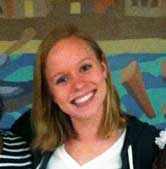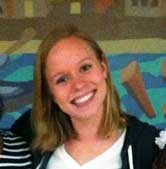 Noyce Teacher Scholarship Program funded by $1.2 million grant from the National Science Foundation
Noyce Teacher Scholarship Program funded by $1.2 million grant from the National Science Foundation
KINGSTON, R.I. – May 12, 2014 – Janelle Haire spent last summer as a camp counselor in Olneyville, one of the poorest neighborhoods in Providence. The experience changed her life.
“I want to work with these kids, I want to encourage them, I want them to realize their full potential,” says Haire, a junior at the University of Rhode Island who is studying to be a teacher. “These children need teachers who believe in them, and that’s me.”
Thanks to a federal scholarship aimed at students studying education and math or science, the East Greenwich resident is on her way to achieving her dream: teaching in a poor urban school after she graduates from URI in 2016.
Haire and five other URI students are recipients of the Robert Noyce Teacher Scholarship, funded by a $1.2 million grant from the prestigious National Science Foundation.
 The grant, awarded last summer to the School of Education in the College of Human Science and Services, is intended to inspire URI students to teach in the fields of science, technology, engineering and mathematics, or STEM.
The grant, awarded last summer to the School of Education in the College of Human Science and Services, is intended to inspire URI students to teach in the fields of science, technology, engineering and mathematics, or STEM.
After they graduate, the recipients will teach elementary, middle and high school students in poor school districts in Rhode Island and other communities in the country. (Haire says she will probably stay in Rhode Island.)
The other undergraduate recipients, also juniors, are Justin Ossa, of Warwick; Ian Pilitizer, of New Jersey; and Sarah Zawatsky, of East Providence. Each student received $10,000 this year and will get another $10,000 next year. The students are majoring in education and biology or mathematics.
Two graduate students also won scholarships: Andrea Drzewianowski, of South Kingstown, and Rachel Naylor, of West Warwick and Glocester. Each student received a $40,000 stipend and is pursuing a master’s degree in education with teacher certification.
Also, freshmen and sophomores are receiving paid summer internships – at Save the Bay, the Norman Bird Sanctuary and the Providence Children’s Museum – in STEM education areas.
An urban school is a perfect fit for Naylor. After receiving her bachelor’s degree in biology in 2011 from Roanoke College in Virginia, she was an AmeriCorps member at Roger Willams Park Zoo in Providence for two years teaching youngsters from Providence, Central Falls and Pawtucket about the environment.
She enjoyed the work so much she decided to pursue her master’s degree in education at URI. With the Noyce scholarship, she doesn’t have to work part-time and can now focus on her studies. She hopes to work in a Pawtucket high school after graduation in 2015.
“I just fell in love with the kids when I did a practicum there,” she says. “I really connected with them. I’ve worked with kids from pretty much every school district in the state and the kids from urban areas seem to appreciate the help the most. I want to push for them and be an advocate for them and do everything I can for them.”
Initially, Haire was an environmental science major at URI, but decided to change to education and biology to work more closely with people. She considers it an honor to teach children from underprivileged families.
Besides working as a camp counselor for City Camp, a day camp run by the Episcopal Diocese of Rhode Island, Haire also volunteered at Gilbert Stuart Middle School in Elmwood, Providence’s poorest and toughest neighborhood.
She recalls one student who stayed up on school nights until midnight because he had to accompany his parents to work. Another student had to care for a younger sibling and was always late to school. Many students were far behind in reading; an eighth-grade student, for example, was reading at a kindergarten level.
“They need someone to be there for them and to support them and, just as important, to have high expectations for them,” she says. “If you have high expectations, students will try to fulfill them. If you have low expectations, they’ll only get down on themselves.”
Working with poorer children presents challenges, but Haire says it’s also enormously fulfilling. The children appreciate the small pleasures she provides – a trip to a pond to swim or a daylong excursion to a museum. The children inspire her with their resilience and courage, Haire says.
The Noyce scholarship is named for Robert Noyce, co-founder of Intel Corp and the scientist awarded the 1961 patent for the integrated semiconductor. The scholarship was funded through the NSF Authorization Act of 2002 in response to a critical need for teachers in science and math.
Over the next few years, the URI Noyce grant will continue to lure students studying math and science who might not have considered a career in teaching kindergarten through grade 12.
There is still grant money available to award more scholarships, says Anne Seitsinger, interim associate dean in the College of Human Science and Services and coordinator of the URI Noyce program.
Students interested in applying for a Noyce scholarship can contact Seitsinger at anneseitsinger@uri.edu. Graduates of the Noyce program are required to complete two years of teaching in a poor school district for every year of scholarship support. Working teachers also will receive regular professional support from URI education professors.
“I’ve been lucky to have a privileged life so far and now I want to give back,” says Haire. “If I help these children get a better education, then I’ll give them the opportunity to have a better life. What could be more important than that.”
Pictured above:
Janelle Haire, of East Greenwich, a junior at the University of Rhode Island who recently won a Noyce Teacher Scholarship to teach in a poor urban school after she graduates in 2016. Haire is majoring in education and biology.
Photo courtesy of Janelle Haire.
Photo above, in blue sweatshirt: Rachel Taylor, of West Warwick and Glocester, won a $40,000 Noyce Teacher Scholarship to teach in an urban school after graduation. She is pursuing her master’s degree in education from the University of Rhode Island. Photo courtesy of Rachel Taylor.

